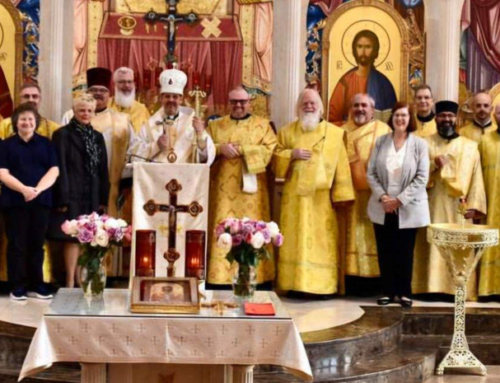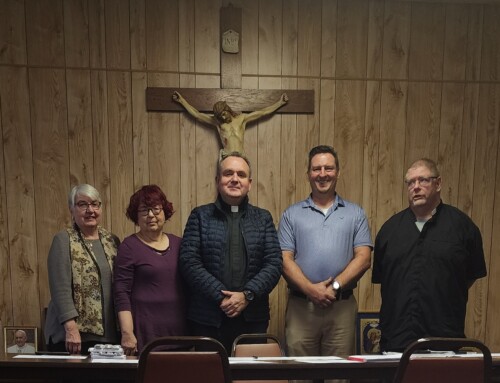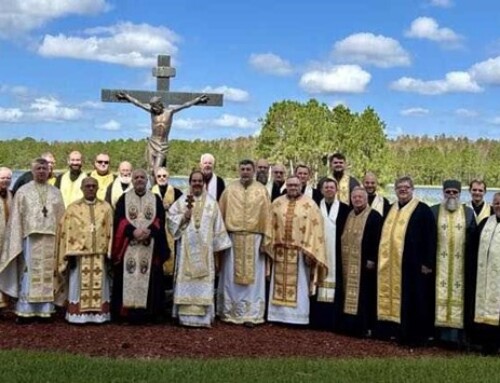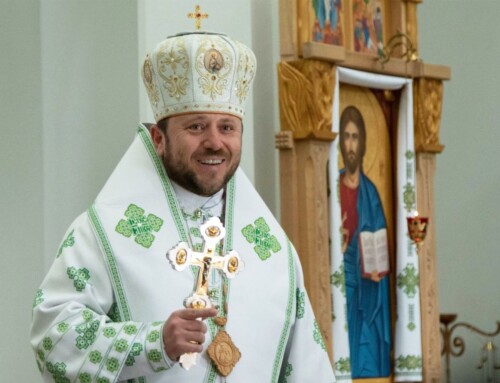CHRISTMAS PASTORAL LETTER OF HIS BEATITUDE SVIATOSLAV
Most Reverend Archbishops and Metropolitans, God-loving Bishops, Very Reverend Clergy, Venerable Monastics, Dearly Beloved Brothers and Sisters, in Ukraine and throughout the world
For you know the grace of our Lord Jesus Christ,
that though he was rich, yet for your sake he became poor,
so that you by his poverty might become rich.
2 Cor 8:9
Christ is born! Glorify Him!
Beloved in Christ!
It is hard to believe how our life has changed from the final carol of last year to the first “Boh Predvichnyj” (God Pre-eternal) of this year’s Christmas Eve. Throughout 2020 we were, it would seem, transported into a different world—a world of fear and uncertainty before the unknown. Yet, in spite of the restrictions, challenges, and human losses we endured due to the coronavirus pandemic, together, as Church, in our families, parishes, communities, and countries, we did not cease to proclaim the good news of hope, love, and joy. And so, this year on the occasion of Christ’s Nativity, we are called in a special way to bear witness before others to the “good news of great joy that will be for all the people: for unto you is born this day in the city of David a Savior, who is Christ the Lord” (Lk 2:10-11).
The mystery of Christmas is found in the joy of the coming of the Son of God into a world, full of affliction, pain, and suffering. He leaves heavenly glory in order to enter into the human frailty of all times, cultures, and people. Christ-God becomes not just a human being, but a poor human being, a person who suffers from the beginning of His earthly life. The Pre-eternal God enters into human history and experiences human hunger and cold, pain and sickness, adversity, and the indifference of society.
A homeless newborn God—what a strange contradiction, what wonder is this divine poverty! The Almighty God becomes poor in order to enrich us. The King of the Universe is placed “in a poor stable-cave, in a manger on hay” (from the carol, Vozveselimsya vsi razom nyni), in order to set a path for us to the heavenly abode. Gazing at this mystery St. Gregory the Theologian says: “The One who enriches became poor; for he took on the poverty of my flesh, in order that I may be enriched in His divinity” (Oratio 45, 9). The Lord has come, the One who with His wounds heals our wounds, our weakness, our affliction. And He remains from generation to generation our Emmanuel, which means “God is with us,” in our needs, pains, and sufferings. The presence of the incarnate God in human history and in our life is our constant and endless joy, both on Nativity Day, and all the days of our life.
In everyday life we sometimes use a word without thinking about its origin or meaning. Language evolves spontaneously and abruptly— we forget where the word came from and fail to grasp its depth. This is the case of the Ukrainian word ubohyj, which is used to describe a poor person. However, when we examine how this word is constructed, we understand that u-Bohyj (in God) is a person through whom the Lord comes to us, a person who is “in God,” that is, under the special care of the Almighty.
Christ teaches us that the materially poor and the poor in spirit, the humble, are happy, are blessed, for theirs is the Kingdom of heaven (see Lk 6:20). Only God is the last hope, support, and salvation for the poor. Their fate is always in God’s hands. And the Lord is especially sensitive to how we treat His poor, that is, the needy, downtrodden, homeless, hungry, lonely, widows, and orphans. Those who disregard the poor scorn their Creator. To wrong such persons is to commit a sin that calls to heaven for vengeance!
This year, in fact, the Synod of Bishops of our Church focused its attention on the face of poverty today. I encourage you to heed the Synodal pastoral letter, entitled “Only one thing will remain yours – that which you have given to the poor!” and examine it in the light of the star of Bethlehem, contemplating the face of the newborn Savior. The Divine Child is present in every destitute person who knocks on the door of our heart, as Joseph knocked on the doors of the inns in Bethlehem.
Then, the wise men from the East hurried to the town of David, in order to bring gifts to the King of the ages, who was born as a little child in a stable-cave—gold, frankincense, and myrrh. Today, the infant Jesus is present in the sick, the frail, the homeless, and the neglected, who wait for someone to help them, to bring them gifts—the gold of a compassionate word, the incense of brotherhood, and the myrrh of immediate assistance, necessary for life. Those who stretch out their hand to the poor become rich with God and become partakers in the eternal goodness of the Creator Himself.
We are celebrating Christmas in the midst of a worldwide situation of human anguish, brought on by the coronavirus pandemic. We have not yet fully grasped or understood all the consequences and faces of this global misfortune. We do not know what changes await us in the sphere of economic, social-community, and church life… But we have already understood that the virus is not interested, neither in our place of residence, nor in our wealth or social status. All of us are equally in danger of infection, and a new threat of poverty hangs over all corners of the globe. All of us in the same way need the kind of help and strength that goes beyond human abilities and power. For this reason, Christ’s Nativity is for us a ray of hope and joy in the midst of today’s dark fear and confusion, and each one of us must be open to God’s grace, which pours out on us without ceasing, even in the worst of times.
To celebrate Christmas in a time of pandemic is to enlighten those who dwell in darkness, as the prophet Isaiah foretold: “The people who walked in darkness have seen a great light; those who dwelt in a land of deep darkness, on them has light shined” (Isaiah 9:2). If we are permitted to gather—with proper distancing, of course—may our eyes shine with a joy that is visible to all. Let us wear masks, when necessary, but let them not silence our traditional carols. Let us celebrate as we are able. Let us acclaim the birth of the Savior, however possible, so that even in this pandemic we might bear witness to the most important truth of human history—that we are not alone or abandoned, because “God is with us!”
Today let us bring to Bethlehem as our gift for the newborn Savior our own poverty and the wounds of humanity today, and let us ask Him for the richness of Divine wisdom in order to overcome this disease, for the fullness of divine strength in order to deal with its effects on society, on the life and health of every person. Above all, let us ask for the richness of His love, which alone can restore this distressed world of ours, and grant it hope, security, and joy. Solidarity with and closeness to those in need, participation in their pain and anxiety, rather than escape from the suffering that hangs over us all today—this will grant us the possibility to be merry and truly celebrate Christmas this year. Therefore, let us hurry to the creche where our Savior rests in a manger, and together with the shepherds and wise men let us sing:
The pre-eternal God has been born!
Today he came from the heavens,
To save all his people,
And has comforted all!
Dear Brother and Sisters! In spite of our poverty and frailty, today we are rich in the joy and love of our newborn Savior. With Christ’s Nativity, I sincerely greet you all: from Kyiv to London, from Buenos Aires to Melbourne, from Winnipeg to Zelenyj Klyn—those who are celebrating today in their family circle and those who are keeping distance from their loved ones to protect them from danger, those who are able to attend church services for the Feast, and those who at home join in community prayer through social media. I especially greet all medical workers who, in spite of real danger to themselves and their families, tirelessly and with great sacrifice give of their time and talents for the health of others. I embrace those who suffer physical and spiritual wounds. I send a word of comfort to those who this year lost family members and friends, and for whom it is particularly painful to approach the festive table this Christmas eve. I unite myself in prayer with those who fearlessly stand on the frontlines and defend our country and people, risking their lives not only before the threat of the insidious sniper’s bullet, but also before the microscopic virus-enemy that has come upon us and inflicts on us added suffering and distress. May the all-merciful Lord, who in His infinite love has visited our poverty, fill the heart of each and every one of us, Dear Brothers and Sisters, with His peace, His grace and hope!
From the bottom of my heart, I wish all of you the authentic joy of the children of God, a tasty kutia, a cheerful celebration of Christ’s Nativity, and a happy, peaceful, and blessed New Year!
Christ is born! Glorify Him!
† SVIATOSLAV
Given in Kyiv
at the Patriarchal Cathedral of the Resurrection of Christ,
on the day of the all-praiseworthy Apostle Andrew the First-called
the 13th of December (30th of November) in the 2020th Year of our Lord





